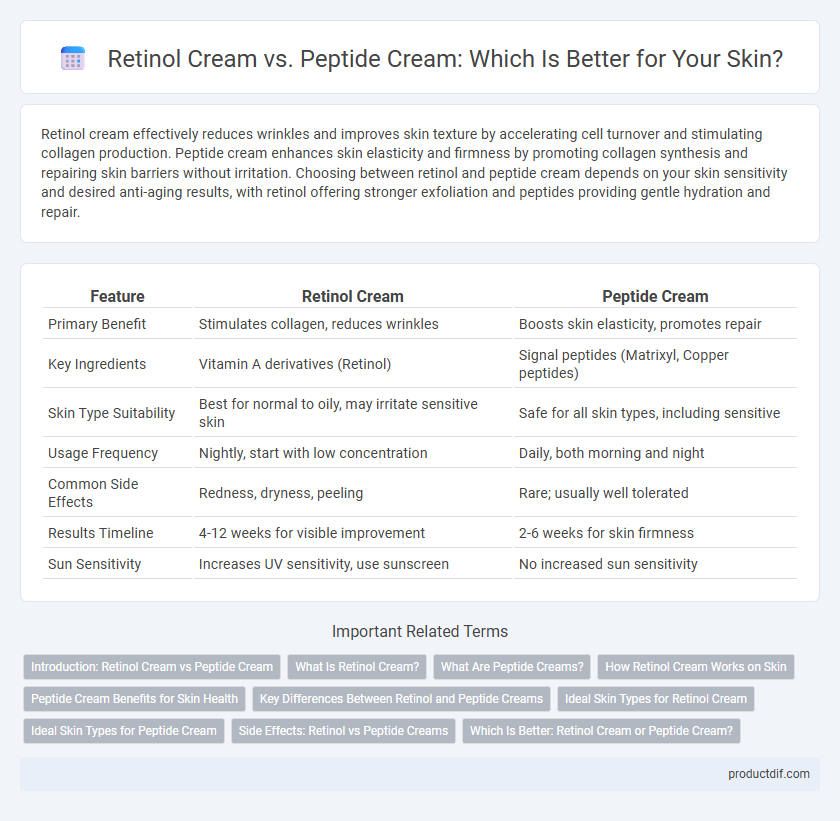Retinol cream effectively reduces wrinkles and improves skin texture by accelerating cell turnover and stimulating collagen production. Peptide cream enhances skin elasticity and firmness by promoting collagen synthesis and repairing skin barriers without irritation. Choosing between retinol and peptide cream depends on your skin sensitivity and desired anti-aging results, with retinol offering stronger exfoliation and peptides providing gentle hydration and repair.
Table of Comparison
| Feature | Retinol Cream | Peptide Cream |
|---|---|---|
| Primary Benefit | Stimulates collagen, reduces wrinkles | Boosts skin elasticity, promotes repair |
| Key Ingredients | Vitamin A derivatives (Retinol) | Signal peptides (Matrixyl, Copper peptides) |
| Skin Type Suitability | Best for normal to oily, may irritate sensitive skin | Safe for all skin types, including sensitive |
| Usage Frequency | Nightly, start with low concentration | Daily, both morning and night |
| Common Side Effects | Redness, dryness, peeling | Rare; usually well tolerated |
| Results Timeline | 4-12 weeks for visible improvement | 2-6 weeks for skin firmness |
| Sun Sensitivity | Increases UV sensitivity, use sunscreen | No increased sun sensitivity |
Introduction: Retinol Cream vs Peptide Cream
Retinol cream, derived from vitamin A, accelerates cell turnover and stimulates collagen production to reduce fine lines and improve skin texture. Peptide cream contains short chains of amino acids that signal skin to produce collagen and support tissue repair, enhancing firmness and hydration. Both products target aging skin but differ in mechanism and potential irritation, making formulation and skin type crucial for effective use.
What Is Retinol Cream?
Retinol cream is a potent skincare product derived from Vitamin A, widely acclaimed for its ability to accelerate cell turnover and stimulate collagen production, resulting in smoother, firmer skin. It effectively targets fine lines, wrinkles, and uneven skin tone by promoting skin regeneration and enhancing texture. Retinol's antioxidant properties also help combat environmental damage, making it a staple in anti-aging cosmetic routines.
What Are Peptide Creams?
Peptide creams contain short chains of amino acids that stimulate collagen production and improve skin elasticity, making them effective for anti-aging and skin repair. These creams promote cellular communication and enhance the skin's natural barrier, helping to reduce wrinkles and boost hydration. Compared to retinol creams, peptide formulations are typically gentler, suitable for sensitive skin, and support long-term skin health without causing irritation.
How Retinol Cream Works on Skin
Retinol cream works on skin by accelerating cell turnover, promoting the shedding of dead skin cells and the growth of new, healthy cells to reduce fine lines and wrinkles. It stimulates collagen production, which improves skin elasticity and firmness, resulting in a smoother, more youthful complexion. Retinol also helps to unclog pores and reduce acne, enhancing overall skin texture and tone.
Peptide Cream Benefits for Skin Health
Peptide cream stimulates collagen production, improving skin elasticity and reducing wrinkles for a youthful complexion. Rich in amino acids, it enhances skin barrier function and promotes cell regeneration, leading to smoother, firmer skin. Regular use of peptide cream supports long-term skin hydration and resilience, making it essential for maintaining healthy, radiant skin.
Key Differences Between Retinol and Peptide Creams
Retinol creams primarily target skin cell turnover and collagen production by stimulating epidermal renewal, making them effective for reducing fine lines and hyperpigmentation. Peptide creams, composed of amino acid chains, support skin repair and firmness by signaling cells to produce collagen, enhancing skin elasticity without the irritation often caused by retinol. The choice between retinol and peptide creams depends on skin sensitivity and specific concerns, with retinol suited for anti-aging and exfoliation, while peptides are ideal for gentle collagen boosting and hydration.
Ideal Skin Types for Retinol Cream
Retinol cream is ideal for individuals with normal to oily skin who are targeting acne, fine lines, and uneven texture due to its exfoliating and cell-regenerating properties. Sensitive or dry skin types may experience irritation or dryness from retinol's potency, making peptide cream a gentler alternative. Retinol's ability to stimulate collagen production and accelerate skin renewal suits those seeking anti-aging benefits while managing skin prone to congestion.
Ideal Skin Types for Peptide Cream
Peptide cream is ideal for mature, sensitive, and dry skin types, as it helps stimulate collagen production and improves skin elasticity without causing irritation. Its anti-aging properties support skin repair and hydration, making it suitable for those prone to redness or dryness. Unlike retinol, peptide cream is gentler, offering effective skin rejuvenation without the risk of dryness or peeling.
Side Effects: Retinol vs Peptide Creams
Retinol cream often causes side effects such as dryness, redness, and peeling, especially during initial use, due to its potent exfoliating properties. Peptide creams are generally well-tolerated with minimal side effects, primarily causing mild irritation or allergic reactions in sensitive skin. Choosing between retinol and peptide creams depends on skin sensitivity and desired results, with peptides offering a gentler alternative for anti-aging without significant irritation.
Which Is Better: Retinol Cream or Peptide Cream?
Retinol cream excels in promoting cell turnover and reducing fine lines by stimulating collagen production, making it ideal for acne-prone or aging skin requiring exfoliation. Peptide cream enhances skin firmness and elasticity by signaling collagen synthesis without irritation, suitable for sensitive or prematurely aging skin. Choosing between retinol and peptide cream depends on individual skin type and concerns, where retinol offers potent anti-aging effects while peptides provide gentle yet effective skin rejuvenation.
Retinol Cream vs Peptide Cream Infographic

 productdif.com
productdif.com